Fruit.
Volunteers who drank beverage sweetened with glucose in US experiment went on to consume more biscuits and sweets than people who didn’t
Fructose may increase cravings for high-calorie foods, according to a new study.
Researchers at the University of Southern California got 24 volunteers to consume a sugary drink sweetened with fructose – the sugar found in fruit – on one day and glucose on another day.
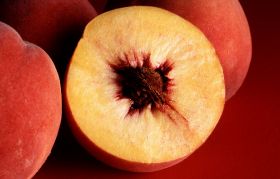
Compared with glucose, the fructose drink led to more hunger and desire for treats such as biscuits and sweets, suggesting that different sugars may affect us differently.
The participants were given a sweetened, cherry-flavoured drink but were not told what was in it – fructose or glucose.
Shortly afterwards, they were asked to rate how hungry they were. They then underwent brain scans while being shown pictures of foods such as biscuits, sweets, burgers and pizza, as well as some ‘neutral’ photographs of buildings.
Some days later, the same volunteers came in again and repeated the experiment. The only difference was the type of sweetener added to their cherry drink.
The brain scans showed that people responded more strongly to photos of food if they had been drinking fructose, rather than glucose. Some of the subjects also reported more food cravings for treats shortly after consuming fructose.
Although fructose and glucose contain the same energy or calories, the body breaks the sugars down in different ways, and the researchers believe this might explain their findings.
Eating an apple before going shopping causes a person to buy 25% more fruit and vegetables, a study found.
US researchers discovered people can be primed to buy healthy food if they eat a wholesome snack before going to the supermarket.
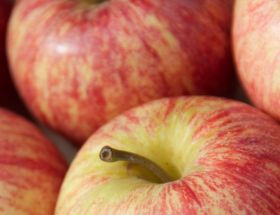
The team, at Cornell University, recommend eating a piece of fruit before hitting the aisles, and argue that supermarkets should offer samples to shoppers to encourage them to make healthy choices.
The researchers carried out three studies to find out if healthy snacks cause shoppers to make better food choices in the shop.
In the first study, 120 shoppers were randomly given either a bit of apple, a piece of cookie or nothing at all when they arrived at the supermarket.
The researchers tracked their purchases and found those who were given the apple bought 28% more fruits and vegetables than those given the cookie.
And they bought 25 per cent more fruits and vegetables than those given no snack at all at the start of their shopping.
Dr Aner Tal, of Cornell University, who carried out the research with his colleague Dr Brian Wansink, said: “What this teaches us is that having a small healthy snack before shopping can put us in a healthier mindset and steer us towards making better food choices.”
Berry breeders have pooled resources in new programme to trial strawberry and raspberry varieties in the Netherlands
Scottish soft-fruit firm Angus Soft Fruits has partnered with Dutch company Genson BV on a new strategic raspberry and strawberry-breeding programme.
The arrangement between the two companies will see new varieties from Angus Soft Fruit’s breeding programme trialled in the Netherlands.
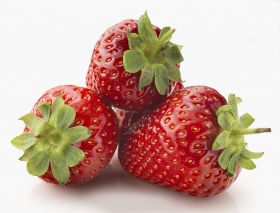
Selected varieties will then be used across all of northern and central Europe, excluding the UK.
Genson BV managing director Marc van Gennip said: “Access to a breeding programme that allows Genson BV to select new varieties to meet the specific requirements of their customer base both for fruit production and retail sales is an exciting new development for the future. Watch this space!”
“The Angus Soft Fruits model is very straight forward,” said Angus Soft Fruits’ R&D director, Dave Griffiths. “Our principal business is as producers of soft fruit. We are very clear that any changes or alterations to the varieties we propose from our breeding programme, offer a significant improvement over currently produced commercial varieties. We are delighted to be working with Genson BV and are excited by the new opportunities this offers everyone involved.”
Van Gennip added: “Over the past year or so, we have reviewed our activities in soft fruit and concluded that we would like to offer more to our customers both at the point of production and the sale of soft fruit.
“We looked at various models of innovation in the soft fruit industry and concluded that the Angus Soft Fruit model was most suited to our requirements. Angus Soft Fruits have, over the years really focused on the needs of their grower base and have demonstrated that an in house programme that has clear objectives can, over a short period of time, provide exciting options for those involved.”
Angus Soft Fruits has produced several successful commercial varieties in the past, including premium variety Ava, day-neutral variety Islay and long-season variety Avarosa.
The company also has several new June-bearer varieties in the final year of selection process for imminent release, as well as new raspberry varieties that show “great commercial potential”.
Italian apple association Assomela and the French inter-professional organisation Interfel have been awarded more than €2.8m in funding by the European Commission to support a three-year campaign aimed at boosting consumption of apples in non-EU markets.
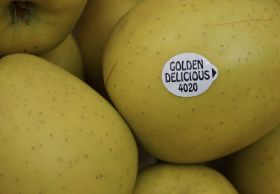
The campaign, which has a combined budget of €5.6m including funds provided by Assomela, Interfel and their own governments, will continue the work carried out by the two organisations as part of a three-year project called European Fresh Attitude, which focused on apples and kiwifruit in so-called third countries.
The results of that project have been described as “extremely positive” by representatives of Assomela, which counts major apple suppliers Vog, VI.P, Melinda and La Trentina among its members.
The aim of the new project is to raise awareness and encourage exports of Italian and French apples to markets in Africa, China, the Middle East, Norway, Russia, South-East Asia and South Korea.
As well as enabling the groups to promote the campaign at key trade events likes World Food Moscow and Asia Fruit Logistica in Hong Kong, the funds will also be used to pay for PR activities at point of sale and at major sporting events in Morocco, Israel and Norway.
Giulia Montanaro, head of international relations at Assomela, welcomed the EC’s decision to renew its financial support for the campaign.
“Consolidating and increasing exports of Italian apples outside the EU is fundamental at a time like this and the project that’s been approved can be a useful tool for our member producer organisations in reaching that objective,” she said.
Montanaro added that the new project’s approval had been made more likely thanks to the good collaboration between Italian and French counterparts over the past few years, a kind of cross-border teamwork that could make it easier to enter new markets in future.
Judges unable to split Waitrose and Sainsbury’s as 21st Bramley apple awards celebrate industry excellence
To a retailer, sharing a stage with a competitor is usually the ultimate no-no.
But it was all smiles at the Brammy Awards yesterday as representatives of Sainsbury’s and Waitrose posed for photos after becoming the first joint-winners of the Best Bramley Retailer of the Year gong.
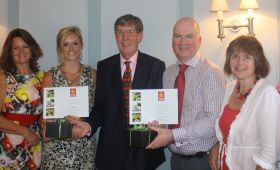
The 21st Brammy Awards was held at Quo Vadis in London, having skipped a year due to the poor crop in 2013. Judges said they were unable to split the two retailers, with Sainsbury’s having shown widespread support for Bramley within its Eat Well For Less campaign, recipe development with Jack Monroe and social media activity, while Waitrose impressed with its dedication to promoting the versatility and cooking qualities of the fruit.
Best Manufacturer of a Savoury Bramley Product was Darlington & Daughters for Mrs Darlington’s Autumn Fruit Chutney, while Tesco Apple Pie by Kensey Foods won the Sweet Bramley Product category.
Best Bramley Apple Sauce went to Cottage Delight, while Chegworth Valley got the nod for best Bramley Apple Drink.
Mr Kipling was named Best Catering/Foodservice Company, and in the individual categories The Times’s Lindsey Bareham won Best Bramley Food Writer and Tom Kerridge was Best Media Chef.
Adrian Barlow, chairman of the Bramley Apple Campaign, said: “The awards present the industry with an opportunity to recognise retailers, manufacturers, catering companies, journalists and chefs who are championing the iconic Bramley apple. The winners have shown outstanding support for Bramley apples over the past year through the quality and breadth of products they have developed, the innovative promotional activities they have undertaken, and their highlighting of Bramley in the media. I am delighted that we have this opportunity to celebrate their achievements.”
Weather conditions have been generous to Britain’s blackcurrant growers, with Ribena in line to get a sweet, bumper crop
British blackcurrant growers are reaping the benefits of ideal winter weather conditions, with this year’s – early – crop set to be as healthy as ever.
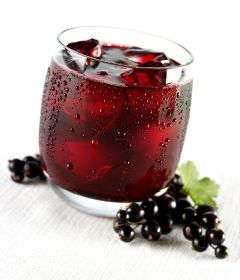
According to The Blackcurrant Foundation, early-season cold allowed for a good level of bud break and strong crop ripening, the winter rains ensured water-store in the ground, enabling the swelling that results in larger berries, and recent warmer, sunnier periods have improved brix levels to averages of at least 16%, meaning there will be a sweeter-tasting crop of British blackcurrants for 2014.
As a result, the foundation says it will be able to provide Lucozade Ribena Suntory Ltd with high-quality produce for Ribena, which accounts for upwards of 90% of Britain’s blackcurrant crop.
Jo Hilditch, chair of The Blackcurrant Foundation, said: “With Ribena continuing to maintain its place as the best-selling product range in the juice drinks sector with a value of £66.8 million and growing at a rate of 20.3% according to Nielsen data, it is vital that the foundation is able to provide large quantity and high-quality berries to assist Lucozade Ribena Suntory in driving growth within the soft drink sector.
“This season has experienced all the factors required for a strong-performing crop. We understand Lucozade Ribena Suntory’s need for high-quality and specially-bred British blackcurrants that go into Ribena and we are privileged to be able to continue fulfilling this requirement. We are very pleased to say that the berries are looking extremely healthy and the season is due to start earlier than in 2013.”
Blackcurrants are renowned for containing high levels of antioxidants, which can help to prevent Alzheimer’s, heart disease, eye strain, MRSA and urinary tract infections.
Switching from regular to organic produce could give same benefits as adding one or two portions to your current 5 A DAY intake
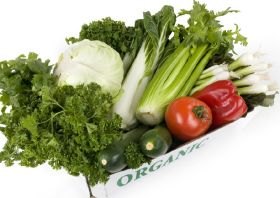
Organic food contains more of the antioxidant compounds linked to better health and lower levels of toxic metals and pesticides, according to a new study. The international team behind the study suggest that switching from regular to organic fruit and vegetables could give the same benefits as adding one or two portions of the 5 A DAY currently recommended, The Guardian reports.
The news outlet reported that the team, led by Professor Carlo Leifert at the University of Newcastle, found that there are “statistically significant, meaningful” differences between organic and regular produce, with a range of antioxidants being “substantially higher” – between 19% and 69% – in organic food.
It is believed to be the first study to demonstrate clear and wide-ranging differences between organic and conventional fruits, vegetables and cereals.
The researchers say the increased levels of antioxidants are equivalent to “one to two of the five portions of fruits and vegetables recommended to be consumed daily, and would therefore be significant and meaningful in terms of human nutrition, if information linking these [compounds] to the health benefits associated with increased fruit, vegetable and whole grain consumption is confirmed.”
However, Tom Sanders, a professor of nutrition at King’s College London, told The Guardian that while the research did show some differences, “the question is are they within natural variation? And are they nutritionally relevant? I am not convinced.”
He added that Leifert’s work had caused controversy in the past.
The results are based on an analysis of a record-breaking 343 previously peer-reviewed studies from all over the world which examine differences between organic and conventional fruit, vegetables and cereals.
The research is due to be published in the British Journal of Nutrition next week. It has, however, appeared on numerous medical sites this week.
The first shipment of Australian ‘Tiger Fuji’ apples is on way and due to dock in Shanghai on Wednesday
The first container of the Australian striped apple, branded ‘Tiger Fuji’, is due to reach China on Wednesday.
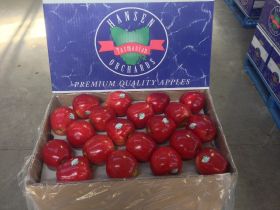
Southern Tasmanian apple grower Andrew Scott from Scott Brothers told Asiafruit he’s keeping his fingers crossed it all goes well when the first container of Tiger Fuji apples reaches Shanghai.
“The trial shipments we sent to Hong Kong last year have been received really well,” said Scott. “So there’s no reason to believe it will be otherwise for the shipment to China.”
The sweet tasting, well-polished apple variety with a deep red colour has a long shelf life, said Scott, meaning it should travel well.
“This is about opening the door for all Australian apple growers, not just Tasmanians,” said Phil Pyke from Fruit Growers Tasmania, adding that Tasmania has been shipping apples to China for some time, albeit some years with much smaller quantities. “Now, we’re getting back into the game.”
“We don’t want to be a one hit wonder,” said Scott. “We want to develop a long-lasting, good quality relationship with importers and marketers to develop a cohesive business.”
Tasmanian Hansen Orchards are exporting the Scott Brothers’ Tiger Fuji, with NPC International taking care of the marketing on the ground in China.
After a trial shipment of Tiger Fuji apples to Hong Kong last year, Hansen Orchards are now planning to pack another 40ft container to Hong Kong on Monday.
Growers claim the modifications effectively give Morocco free access to the European market
Spain has criticised a European Commission to reform the Entry Price System for tomatoes claiming it will cause significant harm to Spanish producers by clearing the way for a massive influx of Moroccan tomatoes during the peak of the Spanish season.
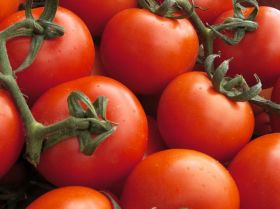
The Commission announced on Monday that it would modify the way it calculates entry prices to include cherry tomatoes, instead of just round tomatoes. The proposed change will raise the average entry price and effectively means that Morocco will be allowed to export to the EU tariff-free as the entry price at which point the tariff is activated will always be higher than the preferential price of €46.1 per 100kg.
Murcian exporter association Proexport accused the commission of caving in to pressure from Morocco and other non-EU countries and effectively given them free access to the European market.
“This decision is a disaster for Spain’s tomato producers and leaves us defenceless,” said José Hernández, president of Proexport and Fepex’s Tomato Committee. “This will bring about a new pricing crisis and provoke growers to abandon farms leading to significant job losses.”
The Spanish government has been calling for the Commission to apply the rules set out under article 4 of the Association Agreement between Morocco and the EU, which requires that exports from the African country are maintained at a stable level to avoid oversupply. It also called for the entry price to be raised in order to offset the effects of the changes to the method of calculating the entry price.
EU imports of Moroccan tomatoes have increased from 194,000 tonnes in 2004 to 369,000 tonnes last year.